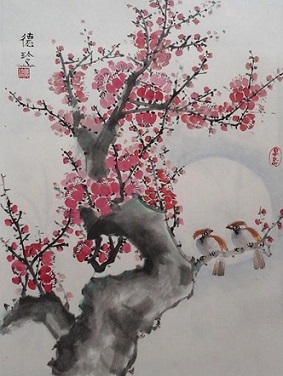
Courtesy of: https://www.darlenekaplan.com/shop/
I never cried for my mother when she died, nor am I inclined to do so now, three months later. At first, I thought my behavior peculiar. A counselor assured me it wasn’t. “Some people need to hold on to their grief. You’ll cry when you’re ready.”
As the weeks pass, I grow more certain he is wrong. I shall never cry for my mother because her passing taught me to be at peace with the end of life.
I have written of my previous fears about losing my mother–how a phone call at odd hours could leave me breathless, or an email from her doctor. If I am honest, I spoiled my time with her by living in the twilight of dread. “Please don’t die…not now.” Such was my mantra each time I entered her room.
In her final days, when she was unable to speak, when her labored breathing was the only sign of life, I held her hand to keep the connection between us. If she had the strength, she’d squeeze my fingers. How skeletal that hand was, peeking above the blanket, the bones sheathed in skin that was dry and paper-thin–too frail, it would seem, to contain the veins pressing hard against it. Yet her touch was warm, the last vestige of dying light.
Even so, knowing the moments of her existence could be counted by a child, my thought-mantra persisted and grew more intense. “Please don’t die, moma. Please don’t die.” A foolish wish is the last resort of the desperate.
On the afternoon of her passing, unaware that our time together was to be measured in hours, I sat beside her bed, stroking her hand as before, the mantra clanging inside me, without purpose, like an alarm bell in a ghost town. No one could hear my quiet moan and yet it was real, a pain deeper than I had ever experienced. Where is the blood, I wondered? There should be blood.
As if she could read my thoughts, my mother squeezed my fingers. It would be for the last time, though I was yet to know it. Shaken by its intensity, I wondered with death so near how she could manage this almost spectral communication.
Call me mad, but that touch did have mystical power. When I felt it, something shifted inside me–as if a warehouse worker had removed a box to clear a path between her and me. My shoulders slumped without willing them to do so. Then, uttering a sigh, I closed my eyes. In the darkness, I saw Death’s presence, not as the terrifying figure I had imagined, but as an attendant whose purpose was to ease pain. My mother’s touch conveyed that this was true. The time had come to set aside my foolish mantra and let go.
Several weeks have passed since her life cycle ended. Yet, at any hour of the day, I can be jolted by guilt, imagining I’ve forgotten to call or pay her a visit. Then, just a swiftly, I remember these tasks are no longer necessary or possible. The awakening is always unsettling, leaving me to feel like a wayfarer marooned upon a beach and staring out to sea. At such moments, waves of longing crash over me to threaten my balance. Then seconds later, those waves retreat but with a force that pulls me toward the far horizon.
In time, these sensations will lose their authority, I am certain. My mother would wish it. She wanted me to accept her death and at that same moment, she introduced me to mine… somewhere in the future. I wonder how we humans would treat one another if we could sense death as a permanent presence? If we could carry that awareness inside us like the audible ticking of a heartbeat, would we– knowing both kings and paupers travel the same road–choose to be anything but kind to one another? I thank my mother for introducing me to this constant companion, an awareness meant to give life urgency and make it richer. To despoil her gift with tears would dishonor her last maternal effort to push me toward life.
